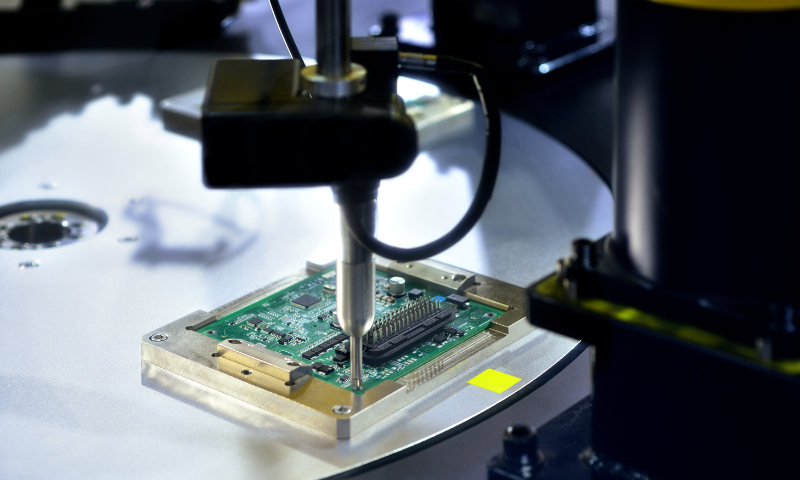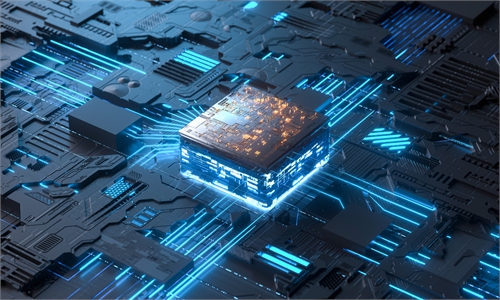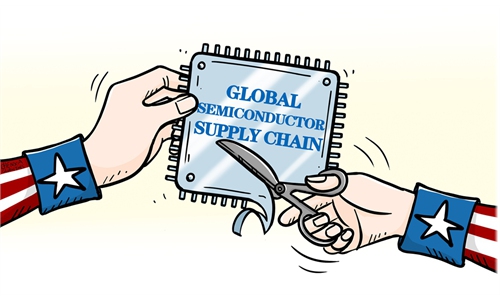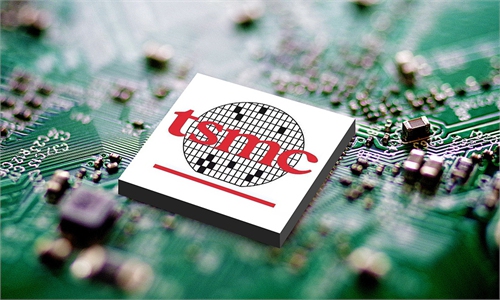China's No.2 chip foundry Hua Hong Semi debuts in Shanghai; A-share market's largest IPO this year

Production of semiconductor chip File photo: VCG
China's second-largest chip foundry Hua Hong Semiconductor made a stellar trading debut on the country's NASDAQ-style sci-tech innovation board - known as the STAR Market in Shanghai - on Monday after raising 21.2 billion yuan ($2.95 billion), the largest IPO in the A-share market so far this year.
Also on Monday, the Shanghai Stock Exchange STAR 100 Index, a new indicator tracking the performance of companies from the STAR Market, went online amid the supporting momentum from the nation's capital market.
The company's success signals China's intensified efforts to achieve self-reliance in the semiconductor sector and spur its growth, aiming to break the technology blockade by the US.
The shares closed at 54 yuan, an increase of 3.85 percent, after opening more than 13 percent higher on Monday.
Hua Hong issued 408 million shares at 52 yuan each with the market capitalization reaching 89.2 billion yuan. The IPO was the third-largest ever for the Shanghai STAR Market, after the 53.23 billion yuan IPO of Semiconductor Manufacturing International Corp in 2020 and BeiGene Ltd's 22.16 billion yuan in 2021.
Chinese companies are pushing hard for technological progress and business expansion in a bid to tackle suppression by the US, and China's strengthened support for the semiconductor sector - along with other sci-tech industries - has boosted the development pace of related companies.
Xiang Ligang, director-general of the Beijing-based Information Consumption Alliance, hailed Hua Hong's successful debut. Xiang said that the US suppression of China's technology industry has accelerated the business and technology development of companies like Hua Hong as more domestic enterprises have opted to cooperate with them.
Ma Jihua, a Beijing-based senior industry analyst, agreed with Xiang's view, saying that Chinese industrial players have achieved sustainable development potential with market demand.
Both Xiang and Ma emphasized China's implementation of support policies in various areas, from capital investment to policies, as a vital role in continuously promoting the country's progress in high-tech industries.
Companies like Hua Hong can catch up on technological development rapidly thanks to these policies, which will enhance their competitiveness, Xiang noted.
The Shanghai Stock Exchange STAR 100 Index selects 100 securities from the STAR Market with medium-sized market capitalization and good liquidity as index samples. Along with the already launched STAR 50 index, the two indicators currently track companies that account for up to 66 percent of the total market capitalization of listed firms on the STAR Market, the Xinhua News Agency reported.
In the first half of 2023, IPO financing for 41 companies on the STAR Market reached 87.7 billion yuan.
Yi Huiman, chairman of the China Securities Regulatory Commission, said in June that measures targeting the capital market to support high-level scientific and technological independence and self-reliance would be introduced in a timely manner.
The strong support of the capital market is just a snapshot of China's determination to further boost its sci-tech development.
China will steadily increase investment in basic research while encouraging enterprises to grow their investment through various ways such as tax incentives, along with other measures on strengthening basic research and achieving China's high-level self-reliance and strength in science and technology, according to an article published by China's top leader on July 31.
Meanwhile, during the second half of the year, China will step up support for scientific and technological innovation, and support the real economy and small and medium-sized enterprises, according to a key meeting,held by the Political Bureau of the Communist Party of China Central Committee in July, to analyze the current economic situation and make arrangements for economic work in the second half of 2023.
China's progress in making technological breakthroughs via research and investment support can't be stopped even if the US is unwilling to accept China's progress in science and technology, Dong Shaopeng, a senior research fellow at the Chongyang Institute for Financial Studies at the Renmin University of China, told the Global Times on Monday. He called for more efforts to better allocate capital resources.



